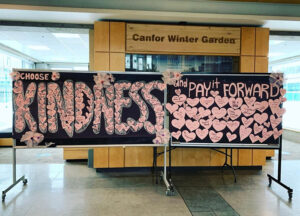
If you’re a functioning part of the human race, then at some point within your life you may have experienced a random act of kindness and the instant feeling of wellbeing that follows.
According to Elizabeth Dunn, a psychology professor at the University of British Columbia (UBC), research has shown there’s a “causal link where, when people behave in this generous, kind way, they actually end up happier themselves.”
“Frankly, I find it very reassuring that humans have this sort of baked-in tendency to experience joy from helping others,” she told CBC News.
Dunn explained that by “changing the conditions that people are facing” she was able to link how random acts of kindness actually benefit the individual performing the good deed. Perhaps even more than the recipient of said deed.
Happiness is determined not by way of thinking and mind but by “behavior”! Elizabeth Dunn Professor University of British Columbia pic.twitter.com/qBXZoMK8sd
— Naoto Miyako (@nmiyako3) August 18, 2017
In one experiment, researchers walked up to randomly selected people on UBC’s campus, gave them either a $5 or $20 bill, then asked them to spend the money by the end of the day. Researches instructed half the recipients to spend the money on someone else, and the other half to spend the money on themselves. No one in the two groups was given any additional information, simply to spend the money as instructed.
“At the end of the day, the subjects don’t really know what the experiment is about. We just asked them about their day and asked them to rate how happy they felt,” Dunn said. “What we saw in that experiment is that people felt happier after using this money to benefit others than after using it to benefit themselves.” That simple experiment (although not scientific) suggests that treating others with kindness is more effective for promoting our own happiness, rather than treating ourselves.
In spite of these experiments, Dunn acknowledges that being kind to ourselves also plays a vital role in one’s happiness. “The form of kindness that is perhaps most beneficial for ourselves is really all about self-compassion … that same sort of gentle compassion that we would extend to a treasured friend or maybe a younger person in our life that we care about,” Dunn surmises.
The professor’s research has also inspired two students at the University of Northern British Columbia (UNBC) Prince George campus to start the “Random Acts of Kindness Club,” that promotes kindness on their campus.
“We want more kindness on the UNBC campus,” said Nadia Mansour, the co-founder of the club. “Everybody is going through the motions of life and we’re all going through something. I think that you can never have enough kindness and that’s what we’re here to do, just spread that positivity around campus and Prince George as a whole.”
The club has erected a large display board at the entrance of the university, raising awareness of mental health issues currently plaguing students at UNBC. Students can randomly pin notes or other messages concerning their personal issues, perhaps seeking mentoring or advice from follow students.

The club currently boasts about 15 members who take part in public promotions regarding mental health and kindness, as well as volunteering with St. Vincent De Paul Society, a Catholic charity, once a month.
“The biggest thing is just leading by example, and we definitely always encourage all the club members to go out and pay it forward,” Mansour said. “Even I get surprised by just how much (the members) truly believe in the message of kindness.”
Now, nearly 30 countries around the world are part of the kindness movement, marking “World Kindness Day” on November 13th.
This story syndicated with permission from My Faith News